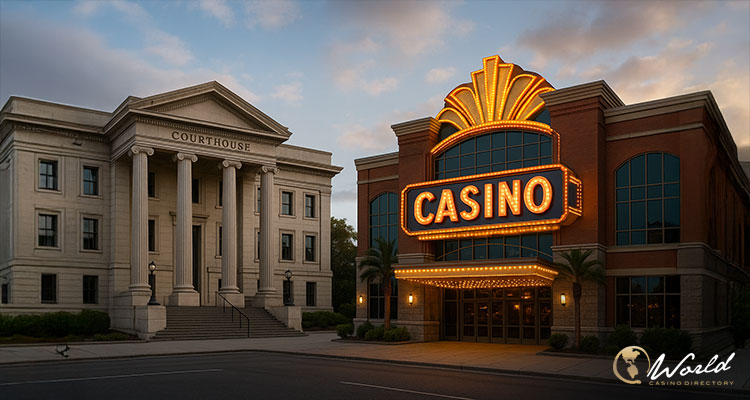A high-profile proposal to develop a major tribal casino in Vallejo remains alive after a federal judge ruled this week that the U.S. Department of the Interior can reassess the project — while also determining the agency violated the tribe’s procedural rights during the process. The decision preserves gaming eligibility for the Scotts Valley Band of Pomo Indians as Interior continues evaluating whether the tribe can pursue its planned $700 million, 400,000-square-foot casino complex near the intersection of Interstate 80 and Highway 37.
Judge Trevor McFadden of the U.S. District Court for the District of Columbia issued the ruling, concluding the Interior Department has the authority to revisit its previous determination but must provide proper due process in doing so. The conflict centers on whether the Vallejo site qualifies as “restored lands” under the Indian Gaming Regulatory Act — a designation that would allow off-reservation gaming if a tribe can demonstrate a historic link to the property.
Judge Restores Tribal Gaming Eligibility but Allows Review to Proceed
In January, federal officials granted trust status for the land and determined it was eligible for gaming, a pivotal step for the Lake County–based Scotts Valley Band. Roughly eleven weeks later, however, Interior temporarily pulled back that approval to reconsider the decision, saying additional evidence needed review. Scotts Valley challenged the move, arguing the agency acted unlawfully and without proper notice.
Judge McFadden determined the Interior Department “possess[es] at least some inherent authority to revisit their prior decisions,” noting the review began within “weeks, not years” of the original ruling. At the same time, he faulted the agency for acting without sufficient advance notification.
“The Court’s remedy does not bar Interior from continuing its reconsideration, nor does it stop the Department from revoking the Band’s gaming eligibility at the end of that process,” McFadden wrote according to Times-Herald. He cautioned, however, that Scotts Valley “would be ill-served by placing undue reliance on today’s decision.”
Despite that warning, tribal leaders characterized the ruling as a major step forward. “This victory is about more than gaming — it’s about fairness, tribal sovereignty, and the fundamental right of our people to move forward in building a brighter future,” said Chairman Shawn Davis. “Today’s decision opens the door to new opportunities and prosperity for our tribal members and for our neighbors in Vallejo and Solano County.”
Opposing Tribes Welcome Renewed Review Effort
The Yocha Dehe Wintun Nation — one of several nearby tribes opposing the casino — also welcomed the ruling, albeit for different reasons. They argue Scotts Valley lacks ancestral ties to the Vallejo area and warn that development would harm sensitive cultural and ecological land.
“Today’s court decision correctly reaffirms the Department of the Interior’s decision to reevaluate this proposed casino, which would destroy irreparable cultural and ecological resources and has already been rejected three other times by the Department,” Yocha Dehe Chair Anthony Roberts said. He added, “We are confident this reconsideration process will reveal the truth Scotts Valley has attempted to hide from the very start – their ancestral lands are not in Vallejo, and they never were.”
The debate over historic connections has become a central flashpoint. Roberts previously stated, “Let me clear. Augustine never lived in Vallejo and never used or occupied lands here,” referring to Chief Shuk Augustine, cited by Scotts Valley to support its claims. “Scotts Valley’s claims about Augustine are simply false.”
Four neighboring tribes — including Yocha Dehe and Kletsel Dehe — have united in opposition, citing cultural protection and fairness concerns. State and local leaders have also voiced concerns, and Gov. Gavin Newsom has criticized similar “restored lands” approvals.
Project Details and Public Response
The Scotts Valley proposal envisions a 24-hour casino, residences, a tribal administration center, a parking facility, and a 45-acre conservation area across roughly 160 acres. Supporters say the project would bring hundreds of millions in annual revenue and economic benefits to Vallejo. Critics fear environmental disruption, cultural site destruction, and increased crime.
Vallejo resident Jimmy Genn shared reservations, saying, “The tribe says crime will not spill out in the surrounding areas. My hometown’s experience is that it does.” Others view the development as a catalyst for tourism and job growth. Former business owner Kimberly Pelham argued, “Imagine people coming across from the ferry, bringing their money, gambling for the night, and spending earnings at the restaurants.”
Scotts Valley maintains it will work with federal officials as review moves forward. “Yocha Dehe can try to spin this decision, but the court ruling will speak for itself,” said Patrick Bergin, counsel for the tribe. “We see this as a victory because it restores our gaming eligibility which should have never been taken away.”


